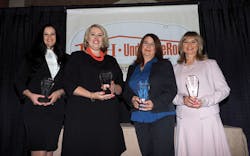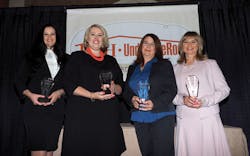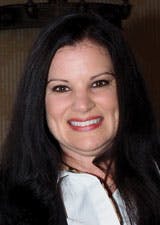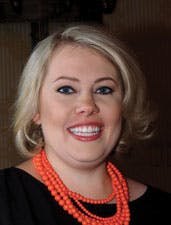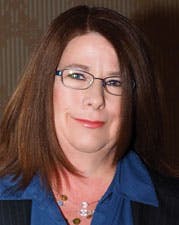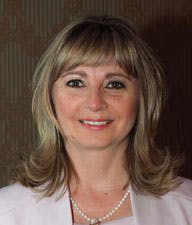2015 Award of Distinction: Sunstar Americas and RDH magazine honor four dental hygienists who inspire us with their distinctive service
Sunstar Americas and RDH magazine honor four hygienists who inspire us with their distinctive service
BY Jackie L. Sanders, RDH, MBA
What defines Award of Distinction recipients? One could call them strong, motivated, visionary, compassionate, and wise. For eight years, I have had the opportunity to introduce the recipients at RDH Under One Roof and read the biographies that bring me to tears. When I reflect, an Award of Distinction recipient is a friend, a parent, a spouse, a sibling, but mostly she or he is an individual who has that the desire to make a difference while here on earth.
In 2002, the Sunstar/RDH Award of Distinction opened the doors for dental hygienists to share their successes and receive recognition for numerous different achievements. The award placed a focus on the accomplishments of those individuals who went above and beyond the traditional expectations for registered dental hygienists. This year, we are proud to acknowledge the receipt of 363 applications - all professionals who have taken their inner desire and turned it into a recognizable success. These numbers are becoming a significant reflection of the amount of talent that exists in the profession and the innovative spirit that exists in so many of you. The profession is changing, and the opportunities are rising for those who are seeking more and wanting to make that difference.
-------------------------------------------------
Articles about previoius award recipients
-------------------------------------------------
Sunstar and RDH magazine have recognized 109 Award of Distinction recipients in the past 14 years. There is a common thread among the recipients, which provides them with the support and direction to continue on their journeys, and each year it is rewarding to witness how previous recipients' lives have changed after receiving the award.
To build upon the positive momentum of the program, Sunstar co-sponsored Dental Impact this year at RDH Under One Roof. Dental Impact provides aspiring dental hygienists the opportunity to learn about community projects while sharing time with the current award recipients.
In addition, the Award of Distinction alumni reception was open to all conference attendees, providing a unique networking event for RDH Under One Roof attendees to meet all of the Award of Distinction recipients.
Sunstar and RDH are honored to introduce the 2015 Award of Distinction recipients. They provide care in Ohio, Oregon, California, and Alberta while representing the voice of the dental hygienists who make a difference.
Please take the time to meet the award recipients below. In closing, I would like to quote Leo Rosten: "The purpose of life is not to be happy-but to matter, to be productive, to be useful, to have it make some difference that you lived at all."
Amy Kinnamon, RDH, EFDA, BSASc
Maineville, Ohio
Every Monday morning, Amy Kinnamon prepares for a three-hour drive across the state to work. The last part of her journey across Ohio is as familiar to her as her childhood. Jackson, Ohio, is a little more than 30 miles away from the West Virginia border in the heart of Appalachia.
Jackson is where Amy Kinnamon spends her time working to turn the tide against rampant caries among Appalachian schoolchildren. "I have devoted the last 11 years of my practice as a dental hygienist to the economically distressed counties of Appalachia in Ohio," she said. "As rewarding as this is, the rate of oral disease continues to rise."
Head Start programs help screen for evidence of early childhood caries, but they do not require that restorative work be completed.
"Hundreds of Head Start children come to my operatory every year, and about 90% have ECC," Amy said. "I usually do not see them again until they enter kindergarten or even later, depending on what public school they attend."
Amy developed an idea for a new protocol for treating pediatric patients, and the first step was to become an expanded functions dental auxiliary (EFDA). State policy allows them to place restorative materials once a dentist has prepped the tooth. While completing the requirements for EFDA certification, she conducted a survey of parents living in the area and discovered that parental attitudes are often a barrier to the follow-up restorative dental care.
Amy hoped that, by offering restorative care at the initial dental appointment, she would increase acceptance of treatment recommendations. She instituted new protocols in the dental office, enabling restorative work to be completed the same day as the hygiene appointment.
"I emerged from EFDA school with little hope of making a difference," she said. "Despite the outcome of my research, I began offering restorative treatment to children who presented with restorative needs. It's been two years and most parents now ask, 'If my child needs work, can we go ahead and do it?'"
She practices in Jackson for three days each week; however, she resides in Maineville, a small town close to Cincinnati. Hence the long drive every Monday morning.
Amy grew up with neighbors like the people in Jackson. Her 18-month study of the rural communities in the foothills of the Appalachians pointed out the "disparity existing between access to dental care and the cultural ramifications."
She cited the example of a former prisoner who reluctantly sought dental care. "At the next appointment, Daniel revealed that he did not brush his teeth because his father and uncle had molested him as a child, and he was unable to put a toothbrush in his mouth. I loaded him up with every adjunct I could think of to clean his mouth and kill bacteria. We decided a washcloth could serve as his toothbrush."
Although the gradual shift into routine home care led to successful dental intervention, Amy Kinnamon stresses the importance of understanding the cultural background of a community.
"It is of utmost importance that dental professionals understand the cultural norms, myths, and attitudes toward dental treatment in the communities in which they work," she said. "It is a multifaceted approach that includes physical, psychological, cultural, and social components to elevate dental care to its proper place and transform the patient into their own dental health-care advocate."
Sarah Kowalski, RDH, BA
Happy Valley, Oregon
The state of Oregon is very aware of its lack of public health access to dental care, and emergency room visits cost the state as much as $8 million a year. Thirty-three out of the 36 counties in the state are designated as having a shortage of dental health providers. In 2014, the oral health community responded by launching its Strategic Plan for Oral Health in Oregon 2014-2915.
Sarah Kowalski plays an important role, serving in the Oregon Health Authority's Public Health Division and working alongside another hygienist, a public health educator, and the state's dental director. "We all work together very collaboratively and function very much as a team," she said.
One of the main projects Sarah is responsible for includes coordinatng the Dental Pilot Project Program. Public health policymakers and legislators are considering a variety of "pilot projects" to improve access to care. By law, proposed projects must be capable of being self-funded. Kowalski attends numerous meetings each week to help "facilitate the administrative aspects of the projects" being considered.
She has a legacy that helps support her daily work with the Dental Pilot Project Program. Raised in Portland, Sarah's mother was a pediatric dentist and the first woman dentist to be appointed to the Oregon Board of Dentistry. Her grandfather served four terms as a state representative in the legislature. Sarah spent 12 years as a hygienist in a private dental practice.
"My experience working in pediatric dentistry made a significant impact on my desire to move into public health," she said. "It became apparent to me that there was a more global problem occurring in our communities, and that was one of limited access." The state acknowledges that many dentists provide limited services for the treatment of Medicaid patients.
"The stories parents told were of spending hours and hours on the phone, calling up to 30 providers before they were offered an appointment six months down the road," Sarah said. "These are the very children who end up in our emergency rooms, which are extremely expensive. The number of dentists who accept Medicaid in Oregon is very low, and most of them who do accept it limit the number they will see."
Sarah recently visited Alaska, home of the Dental Health Aide Therapist Initiative, as a guest of the Kellogg Foundation. Although Oregon is still in the initial stages of determining the feasibility of a midlevel provider, Kowalski hears the objections to dental therapists.
"One of the common concerns I hear about introducing a new midlevel provider is that it will create a two-tiered system of care," she said. "One group of people will see dentists and the others will see the ADHP or DHAT. My response to that is that right now we have a two-tiered system. Those who can afford care, get care; while those who cannot pay, do not get care at all or find it extremely difficult to get even limited care."
Sarah is delighted to be a part of the Oregon public health team dedicated to improving access to care.
"We have a very real workforce problem and we need to find innovative solutions so that all people receive the dental care they deserve," she said. "Access includes other barriers such as lack of transportation and a lack of education around preventive health and dental care. Finding ways to come to the people rather than the traditional dental office model is one step toward seeing more people. I want to make a difference on a larger scale."
Lory Laughter, RDH, MS
Napa, California
Lory Laughter was nominated for this award by Kyle Isaacs, RDH, of Monroe, Oregon. Among other things, Isaacs praised the Dental Hygienists' Alliance for spreading a positive message about the profession through public relations efforts. Lory, who helped form the alliance, referred to it during a recent "Web Weaving" column, which is published in RDH.
As an example, Lory shared a link in which an individual expressed interest in a career in dental hygiene. The dental hygienists responding to the query were brutally honest in their assessments about working conditions. The person making the query finally said, "OK, I guess you all have done a very good job of convincing me not to go into dental hygiene."
Lory wrote, "What a sad commentary about our profession. The authors gave only the negative and left the general impression that all dental hygienists are an unhappy and sour lot."
Isaacs commented that the Dental Hygienists' Alliance is a "way for all dental hygienists to come together and have a say in their career and to be heard."
The alliance mainly communicates to one another through a Facebook group that is open to only dental hygienists. "Our goal is self-regulation and the ability to deliver preventive services anywhere," Lory said. "Note that this is not a midlevel provider objective, but prevention, the thing we are educated to provide."
Lory started her company, Dental IQ, LLC, in 2005 due to her "passion for education, and I saw a lack of it in my area." The annual Napa Dental Experience has grown into a large regional dental hygiene conference.
Isaacs commented, "Lory has had a positive impact on her community in many ways. She has provided food to the local 'table' to feed the homeless, presented about dental health to local schools, and raised money at the Napa Dental Experience each year for VOICES, a service organization for teens transitioning out of foster care."
Lory has retired from clinical dental hygiene, but she supplements her income from her company by serving in professional education roles with Interleukin Genetics, American Eagle, Livionex, and Nuvora, as well as consulting services through Kathleen Johnson and Associates.
Isaacs said Lory's spare time "is devoted to volunteering in her community and providing a warm home to abandoned pets."
Lory obtained her dental hygiene degree from Idaho State University. In 2011, she received the Professional Achievement Award from the university. Isaacs said that the award acknowledged "important contributions to the dental hygiene profession and to her career by improving the social, political, and/or economic well-being of the dental hygiene community."
Lory also obtained her master's degree from University of California, San Francisco last spring.
Michelle Marusiak, RDH
Sturgeon County, Alberta
When she was 12 years old, Michelle Marusiak started performing in nursing homes as part of Klondike Days, a 10-day festival in Edmonton, Alberta. She entertained with dance routines and socialized afterwards with elderly and disabled residents.
"I grew up knowing how special this population is, and they always warmed my heart when I saw the joy on their faces," she said. "After reading articles on seniors living longer and the effects of prescription medications in the oral cavity, I realized that if I could bring entertainment to this population, then I could bring oral health care."
So she has, forming her company, Unique Dental Hygiene, in 2007 after Canadian legislation allowed her to be an independent practitioner. Unique Dental Hygiene provides bedside palliative oral health care in long-term care facilities. Her clients include patients in varying stages of dementia, and the services provided include some basic temporary restorative treatments, as well as an array of preventive treatments.
"By providing the needed oral health-care services to those who have mobility and behavioral issues, I'm able to increase my clients' quality of life by preserving their dentition, gum health, and bone levels as much as possible," Michelle said. "This lessens the chances of dental emergencies, which lessens oral pain and provides clients with the ability to chew their food and receive the nutrition they require."
Her work caught the attention of Alberta regulatory agencies and politicians. George VanderBurg, a conservative member of Alberta's legislature, observed Unique Dental Hygiene's services. The experience led to "an increase in some of the government subsidized dental insurance for vulnerable populations," according to Michelle.
She is also involved with the Alberta Association on Gerontology and has presented seminars on providing quality initiatives in oral health-care services for seniors living in long-term care.
But childhood experiences remain a part of who she is. "My greatest achievement is seeing and feeling the emotional connection I have with my clients when I provide bedside oral health-care services to clients who have dementia."
Bedside is a key word. Michelle said many patients experience "heightened anxiety," for example, when they're moved to another location inside the nursing home, and she wants to make them "feel safe and nurtured."
Michelle encourages dental professionals to "take the time to explore how to connect with patients" receiving palliative care in a long-term care facility.
"Vulnerable populations are slipping through the cracks," she said. "Oral health-care benefits are inadequate and in some cases absent for low-income families."
Michelle's goal is to work to improve dental policies and practices to address this inequity. To address this oral health inequity immediately, Michelle's goal is to find a charity to donate money each year to pay for needed restorative care and more frequent oral hygiene care that are not currently adequately covered by government subsidized and/or private dental insurance benefits.
Michelle is pursuing advanced education to enhance her knowledge in gerontology, and her goal is a master's in dental hygiene, followed by a doctorate that focuses on oral health policies for older adults, patients with disabilities, and low-income families. She believes the credentials will "aid in my advocacy efforts for this vulnerable population to increase accessibility and affordability by addressing oral health-care standards at a policy level." RDH
Jackie L. Sanders, RDH, MBA, is the manager of professional relations at Sunstar Americas, Inc.
